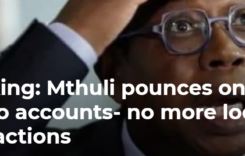On December 3, 2021, the Zimbabwe government gazetted the Data Protection Act.
The law was originally referred to as the Cyber Security and Data Protection Bill.
The Zimbabwe government says the law will safeguard users in cyberspace and that it is in line with similar laws in other countries. However, critics such as the Media Institute of Southern Africa, say some of the clauses may be used to stifle the work of civil society and whistleblowers, and that part of the law violates freedom of expression as guaranteed in the national Constitution.
Why was the law enacted?
According to its memorandum, the law is meant to consolidate cyber-related offences and provide for data protection with due regard to the Declaration of Rights under the Constitution and the public and national interest, create a technology-driven business environment and encourage technological development and the lawful use of technology.
The Data Protection Act consolidates several pieces of legislation that govern cyber security and data protection. These include the Postal and Telecommunications Act, Official Secrecy Act, Criminal law (Codification and Reform) Act and the Interceptions of Communications Act.
What does the law say?
Here are some of the offences contained in the consolidated law:
- Transmission of data message inciting violence or damage to property is forbidden. It is illegal to send messages with the intent to incite people to commit acts of violence against any person or persons or to cause damage to any property.
- Sending messages to another person threatening to harm them, or to harm their family and friends, or threatening to damage their property.
- Cyber-bullying and harassment.
- Transmission of false information that is meant to cause harm.
- Transmission of intimate images without consent. For example, you cannot send someone’s nude pictures without that person’s consent. It is also not allowed to take someone’s intimate pictures without them agreeing to it.
- Production and dissemination of racist and xenophobic material.
- Child pornography and exposing children to pornography.
- Sending spam messages is banned; it is illegal for a person to send unsolicited messages to many people under false pretences.
Information sources: Zimbabwe Government Gazette, Veritas, MISA-Zimbabwe
Do you want to use our content? Click Here












